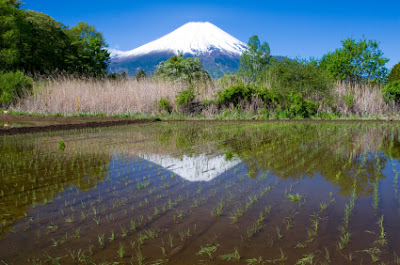"We are losing our attitude of wonder, of contemplation, of listening to creation and thus we no longer manage to interpret within it what Benedict XVI calls 'the rhythm of the love-story between God and man.'"
+ Pope Francis
Food, water, life and Japan
In light of such terrible news, it should be noted that you can help. Your prayers are critical and any donation you can make is, of course, only Christian. Agencies like the Catholic Relief Services can use these funds to get resources to the regions that need it so badly.
And all this must give us pause. I would imagine that, if you’re like me, you take the access of food and water as a given. Fresh water from the tap any time I wish, and when I need food, I just go to the supermarket.
But how fragile is all this? How quickly could any one of our own communities, countries, continents be left without a safe supply and distribution network or systems of water and food? By one account, my home state of
We should take agriculture and the clean water business much more seriously than we do. This is why it is important to note that our Holy Father and local bishops have been for some time calling attention to the importance of farms, farmers, and the systems we need for clean water.
For instance, last fall, Benedict XVI gave this message on World Food Day. In it, he noted the link between humanity’s physical needs and the call of the Gospel.
In order to eliminate hunger and malnutrition, obstacles of self-interest must be overcome so as to make room for a fruitful gratuitousness, manifested in international cooperation as an expression of genuine fraternity. This does not obviate the need for justice, though, and it is important that existing rules be respected and implemented, in addition to whatever plans for intervention and programmes of action may prove necessary. Individuals, peoples and countries must be allowed to shape their own development, taking advantage of external assistance in accordance with priorities and concepts rooted in their traditional techniques, in their culture, in their religious patrimony and in the wisdom passed on from generation to generation within the family.
In
Our commitment to the dignity of every person requires special concern for those who are poor and vulnerable, whose needs are greatest, and whose lives and dignity are often threatened by hunger, poverty, and suffering. In order for people to live a life worthy of their God-given dignity, Catholic social teaching affirms the right and duty to work, the right to economic initiative, the rights of workers to safe working conditions, decent wages and benefits, and the right to organize and join associations to secure these rights.
In light of these principles, our Conference will continue to advocate for policies that protect and encourage family farming on a human scale. We also insist that all agriculture, whatever its scale or structure, must meet fundamental moral criteria. Agriculture in all its forms should be evaluated, regulated, and rewarded based on these principles.
Great stuff! And as always note how the subject begins as always with the dignity of all human life.
And as for water, it is cruelly ironic that as panic broke out in Japan’s great city of Tokyo about the safety of its water—indeed, some ten days after trillions of gallons of surging waters washed away so much and so many—the world would be acknowledging the need of clean water in World Water Day. (And, yes,
Before reading any of the linked documents or sites in more detail, stop and say a prayer, and remember that our fate and that of all our suffering brothers and sisters in
God help the good people of



















